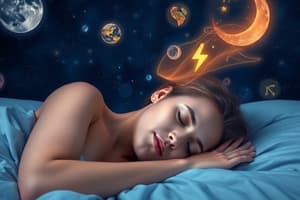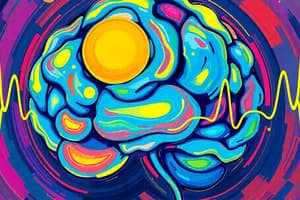Podcast
Questions and Answers
How many hours of sleep do most adults generally require?
How many hours of sleep do most adults generally require?
- 10-12 hours
- 7-8 hours (correct)
- 9-10 hours
- 5-6 hours
Which of the following is NOT one of the theories proposed for why we sleep?
Which of the following is NOT one of the theories proposed for why we sleep?
- Recuperation theory
- Brain processing theory
- Social interaction theory (correct)
- Energy conservation theory
What is the primary purpose of an electroencephalogram (EEG)?
What is the primary purpose of an electroencephalogram (EEG)?
- To measure the heart rate
- To record electrical activity of the brain (correct)
- To analyze eye movement
- To evaluate muscle strength
What is likely to happen to sleep patterns as a person ages?
What is likely to happen to sleep patterns as a person ages?
Which equipment measures muscle activity during sleep?
Which equipment measures muscle activity during sleep?
What role does sleep play in brain functioning according to the outlined theories?
What role does sleep play in brain functioning according to the outlined theories?
Who discovered the capability of displaying electrical brain activity using electrodes?
Who discovered the capability of displaying electrical brain activity using electrodes?
Which age group is most likely to require approximately 9 hours of sleep daily?
Which age group is most likely to require approximately 9 hours of sleep daily?
What cognitive functions are primarily affected by sleep deprivation?
What cognitive functions are primarily affected by sleep deprivation?
Which of the following statements about REM sleep is true?
Which of the following statements about REM sleep is true?
Which effect does sleep deprivation have on one's performance in cognitive ability tests?
Which effect does sleep deprivation have on one's performance in cognitive ability tests?
What was found regarding slow wave sleep (SWS) based on Sakai et al's study?
What was found regarding slow wave sleep (SWS) based on Sakai et al's study?
Which of the following outcomes did participants experience related to SWS after increased mental activity?
Which of the following outcomes did participants experience related to SWS after increased mental activity?
What is the role of slow-wave sleep in relation to memory consolidation?
What is the role of slow-wave sleep in relation to memory consolidation?
What was the result of REM sleep deprivation as indicated by Dement's study?
What was the result of REM sleep deprivation as indicated by Dement's study?
Which aspect of cognitive function is least affected by sleep deprivation according to the studies discussed?
Which aspect of cognitive function is least affected by sleep deprivation according to the studies discussed?
Which stage of sleep is primarily associated with muscle atonia?
Which stage of sleep is primarily associated with muscle atonia?
What happens during microsleeps as a result of sleep deprivation?
What happens during microsleeps as a result of sleep deprivation?
Which researcher is noted for studying REM sleep and its association with dreaming?
Which researcher is noted for studying REM sleep and its association with dreaming?
What effect does sleep deprivation have on cognition according to research?
What effect does sleep deprivation have on cognition according to research?
Which stage of sleep typically demonstrates delta waves and is considered deep sleep?
Which stage of sleep typically demonstrates delta waves and is considered deep sleep?
How do the brain activity levels during REM sleep compare to wakefulness?
How do the brain activity levels during REM sleep compare to wakefulness?
What consistent mood-related effect does moderate sleep deprivation cause?
What consistent mood-related effect does moderate sleep deprivation cause?
According to Van Helder and Radomski, how long did sleep deprivation last in their reviewed studies?
According to Van Helder and Radomski, how long did sleep deprivation last in their reviewed studies?
Flashcards
Electroencephalogram (EEG)
Electroencephalogram (EEG)
The electrical activity of the brain, measured using electrodes placed on the scalp.
Electromyogram (EMG)
Electromyogram (EMG)
Measures muscle activity during sleep using electrodes attached to the chin.
Electrooculogram (EOG)
Electrooculogram (EOG)
Records eye movements during sleep, using electrodes around the eyes.
Brain Waves
Brain Waves
Signup and view all the flashcards
Evolutionary Theory of Sleep
Evolutionary Theory of Sleep
Signup and view all the flashcards
Recuperation Theory of Sleep
Recuperation Theory of Sleep
Signup and view all the flashcards
Brain Processing Theory of Sleep
Brain Processing Theory of Sleep
Signup and view all the flashcards
Sleep Deprivation
Sleep Deprivation
Signup and view all the flashcards
Stage 3 Sleep
Stage 3 Sleep
Signup and view all the flashcards
REM Sleep
REM Sleep
Signup and view all the flashcards
Microsleeps
Microsleeps
Signup and view all the flashcards
Vigilance
Vigilance
Signup and view all the flashcards
Physical Performance
Physical Performance
Signup and view all the flashcards
Muscle Atonia
Muscle Atonia
Signup and view all the flashcards
Sleep Research
Sleep Research
Signup and view all the flashcards
Sleep Deprivation Impact on Physical Performance
Sleep Deprivation Impact on Physical Performance
Signup and view all the flashcards
Sleep Deprivation and IQ
Sleep Deprivation and IQ
Signup and view all the flashcards
Sleep Deprivation and Creativity
Sleep Deprivation and Creativity
Signup and view all the flashcards
Executive Functions and Sleep Deprivation
Executive Functions and Sleep Deprivation
Signup and view all the flashcards
REM Sleep Deprivation Experiment
REM Sleep Deprivation Experiment
Signup and view all the flashcards
REM Sleep and Learning
REM Sleep and Learning
Signup and view all the flashcards
Slow Wave Sleep and Brain Activity
Slow Wave Sleep and Brain Activity
Signup and view all the flashcards
Mental Activity and Slow Wave Sleep
Mental Activity and Slow Wave Sleep
Signup and view all the flashcards
Study Notes
Introduction to Sleep
- Sleep is a crucial part of life, taking up about one-third of a person's time.
- Adults typically need 7-8 hours of sleep, though individual needs vary.
- Infants need more sleep than adults, around 16 hours a day, while teenagers require roughly 9 hours.
- As people age, their sleep patterns change, often becoming lighter and shorter.
Why Do We Sleep?
- Evolutionary/Energy Conservation Theories: Sleep allows us to conserve energy and stay safe at night.
- Recuperation Theories: Sleep helps us recover from the day's exertions.
- Brain Processing Theories: Sleep, unlike recuperation, has a different effect, involving brain activity, memory consolidation, and creativity development.
Measuring Brain Activity
- Hans Berger (1928) invented electroencephalography (EEG) to measure brain waves.
- EEG measures electrical activity in the brain using electrodes attached to the scalp.
- Different brainwave types are recorded during various stages of wakefulness and sleep.
Recording Sleep
- Electroencephalography (EEG): Measures brainwave activity.
- Electromyography (EMG): Measures muscle activity, primarily in the chin.
- Electrooculography (EOG): Measures eye movements.
Stages of Sleep
- Sleep goes through different stages of progression, in a typical cycle.
- Stage 1: Falling asleep, characterized by slow brain waves.
- Stage 2: Deeper sleep, including sleep spindles and K-complexes.
- Stage 3: Slow-wave sleep, deep sleep characterized by slow brain waves (delta waves).
- REM Sleep: A recurring stage of sleep, with rapid eye movements and brain activity similar to wakefulness. Dreams often occur during this stage.
Stages of Sleep: REM Sleep
- REM sleep occurs at a similar stage as other sleep types.
- REM sleep has distinct brainwave activity seen during wakefulness.
- Eyes dart beneath the eyelids in a back and forth motion during REM.
- Muscle activity is reduced during REM (muscle atonia).
- Dreams are often reported after waking from REM sleep.
Sleep Deprivation
- Sleep deprivation ranges from mild to severe, impacting cognitive and physical function.
- Consistent effects of moderate sleep deprivation include increased sleepiness, mood disturbances, and poor performance on vigilance tasks.
Sleep Deprivation & Vigilance
- Continuous sleep deprivation can cause microsleeps.
- Microsleeps are short periods of sleep that occur during wakefulness.
- Microsleeps make it harder to respond to stimuli and tasks in a given time frame.
Sleep Deprivation & Physical Performance
- Sleep deprivation generally has no impact on physical strength or varied levels of cardiovascular responsiveness.
- However, the time it takes to reach a state of exhaustion is significantly reduced when a person is sleep-deprived.
Sleep Deprivation & Cognitive Function
- Cognitive ability is only affected in some tasks, such as creative thinking, planning, and intuitive or insightful thinking in particular.
- IQ tests, in general, show no change from sleep deprivation.
Selective Sleep Deprivation - REM
- Individuals deprived of REM sleep experience a need/desire for an increase in REM sleep.
Role of REM Sleep
- Some studies suggest a facilitating role for REM sleep in learning and memory processes.
Selective Sleep Deprivation - SWS
- Stages 3 (and 4, which isn't always noted) of sleep are called slow-wave sleep (SWS).
- SWS shows lower brain activity than wakefulness.
- Important in memory consolidation and recalling.
Role of Slow Wave Sleep
- SWS, in particular, is often related to memory consolidation.
- Several studies have explored the effects of sleep deprivation on cognitive function, mostly focusing on memory consolidation.
- Some research highlights age-related decreases in slow-wave sleep (SWS) and associated cognitive decline in older adults.
Conclusion
- Sleep is a natural process in most vertebrates.
- Sleep deprivation negatively impacts various cognitive and physical functions, which causes the desire to sleep.
Further Reading
- Details about further readings are provided (and references).
Studying That Suits You
Use AI to generate personalized quizzes and flashcards to suit your learning preferences.
Related Documents
Description
Explore the importance of sleep in human life, its evolutionary significance, and the varying sleep needs across different age groups. Discover how brain activity is measured with techniques like EEG, contributing to our understanding of sleep's role in memory and recovery.




